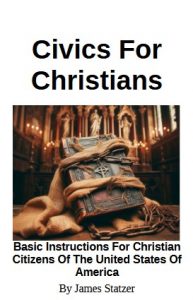Civics For Christians
Basic instructions for Christians living in the United Sates of America.
The Importance of Civics Education: A Look at “Civics For Christians”
In today’s fast-paced, interconnected and diverse nation, the need for comprehensive education that prepares students for active citizenship cannot be overstated. This is particularly true for civics and social studies, subjects that form the foundation of an informed citizenry. However, there is a growing concern that these critical subjects are not being adequately taught in all schools, including Christian schools. This article explores why this is a problem and how a resource like the book “Civics For Christians” can provide a solution.
For readers seeking wisdom at the crossroads of faith and governance. “Civics for Christians” invites you to embrace your dual identity as a follower of Christ and a steward of democracy. Whether you’re a seasoned believer or a seeker, this textbook illuminates the path toward conscientious citizenship.
Inside and cover art by James Statzer.

Get the e-book at Amazon Kindle with this paid affiliate link.
The Challenge:
The absence of comprehensive civics and social studies in a school’s curriculum presents several problems. Firstly, it leads to a lack of civic knowledge. These subjects teach students about their government, their rights, and their responsibilities. Without this knowledge, students may become adults who are disconnected from their civic duties. Many political misconceptions start as paranoia of big government overreach, but it is attributed to powers that do not exist. Sometimes rumors that start this way (whether accidental errors or done deliberately) are based on false information that a basic understanding of how our government functions can easily dispel.
Secondly, it results in a limited perspective. Civics and social studies expose students to diverse cultures, histories, and social issues, broadening their understanding of the world beyond their immediate environment. A right lost to one really is a right lost to all. Some schools teach a short list of cherry-picked topics that can make the children vulnerable to political misconceptions.
Lastly, it reduces opportunities for practicing critical thinking. These subjects encourage students to analyze social and political issues, consider different perspectives, and make reasoned decisions when participating in civic duties like voting.
The Solution: “Civics For Christians”
“Civics For Christians” is a textbook that can address these challenges head-on. It provides a comprehensive guide to understanding civics from a Christian perspective, making it an invaluable resource for Christian schools.
By teaching civics, the book helps create informed citizens who understand their government and their role in it. They learn to exercise their rights, participate in their communities, and contribute to the democratic process. It fills a critical knowledge gap in Christian education in the USA.
The book also promotes understanding and empathy by exposing students to diverse cultures and perspectives. This fosters appreciation for differences, challenges stereotypes, and encourages social harmony. This textbook is up to date and accurate. It can teach how to recognize bad faith partisan actors who take advantage of uninformed Christian citizens for selfish or secular reasons.
Furthermore, “Civics For Christians” enhances critical thinking by engaging students with complex social and political issues. This helps them develop the ability to question, analyze, and form reasoned opinions. Learn the reasons for Supreme Court decisions and the 27 Constitutional Amendments. Read the inspiring story of the boy who change the Constitution.
Chapters:
-
4 Realms of Social Involvement
-
3 Levels of Government
-
3 Branches of Government
-
How the Legislature Works
-
How Elections Work
-
Partisan Politics
-
The Relationship Between Church and State
-
The Law Of the Land
-
27 Constitutional Amendments
-
Criminal Law Court Actions
-
How Law Enforcement Works
-
Civil Law Court Actions
-
How Lawsuits Work
-
Types of Attorneys
-
Being A Good Christian and A Good Citizen
-
Separation of Church and State
-
How to Promote Religious Harmony
-
Respecting Government Authority
-
Political Activity by Religious Organizations
Get the e-book at Amazon Kindle with this paid affiliate link.
Read this excerpt:
The Law of the Ten Commandments and the Constitution
The United States Constitution is not based on the Bible, nor any religious tradition. That is very good news for everyone. Because the legal system of the Decalogue and the United States legal system operate in opposite ways.
When you enter the legal system of the United States Constitution, it is because you have been found, arrested. and forced to appear in court. In the Ten Commandments legal system all will appear before the Judgement Seat at the end of days. There is no other place to be.
In the U.S. Constitution legal system you are innocent until proven guilty. In the Ten Commandments legal system all have sinned and fallen short of the glory of God.
In the U.S. Constitution legal system there are aggravating or mitigating circumstances. In the Ten Commandments legal system any Commandment broken is as serious as if all of them were broken.
The U.S. Constitution legal system has a wide array of punishments to fit different crimes. The Ten Commandments legal system only provides for the death penalty.
In the U.S. Constitution your lawyer advises you to remain silent to not incriminate yourself. When you enter the court of the Ten Commandments everything you don’t confess is held against you.
In the court of the U.S. Constitution there is a judge who wants to prove your guilt, remove your liberty and ruin your life. In the court of the Ten Commandments you have a judge named Jesus Christ who wants to take away your guilt, liberate you from sin, and bring you through to eternal life.



